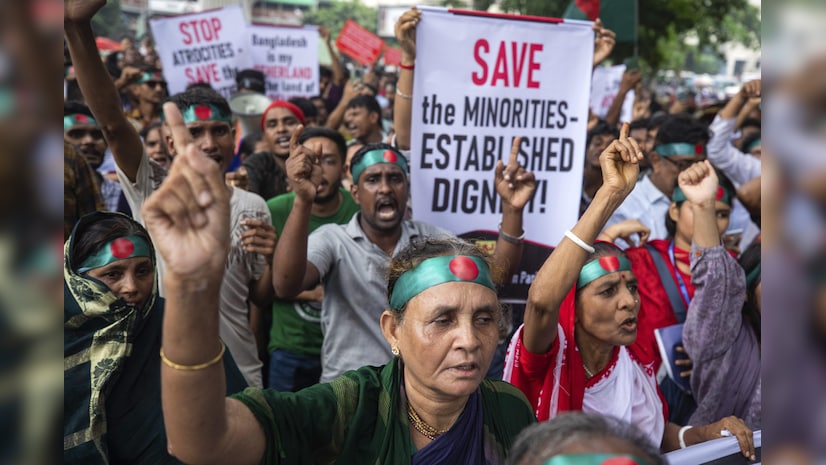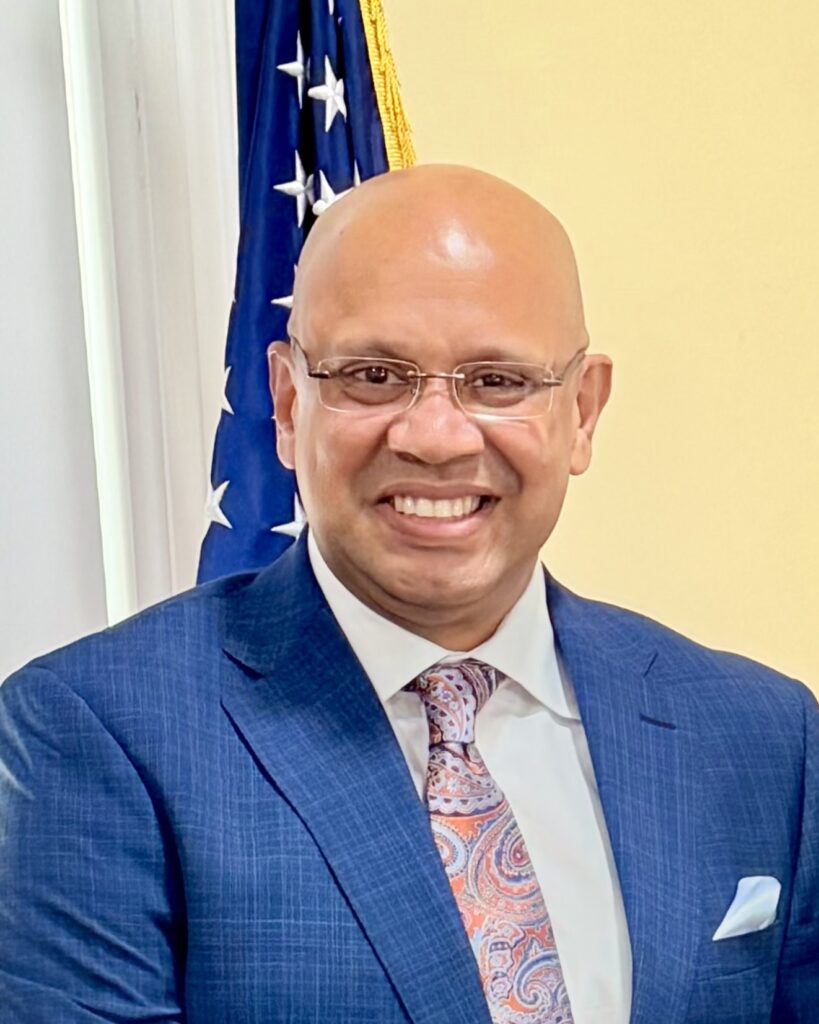By Zahid F Sarder Saddi
“As Islamist extremism surges and political chaos deepens in Bangladesh, President Trump’s bold stance offers a critical warning—the world must act now to prevent a descent into irreversible instability with global consequences.”

Washington, D.C. — Bangladesh stands at a perilous crossroads. As the country moves toward a critical general election, the threat of Islamist extremism is growing at an alarming pace, fueled by political instability, weakened institutions, and an interim government struggling to assert control. The consequences of inaction, both for Bangladesh and the broader region, could be severe.
The crisis of religious persecution in Bangladesh is not new—but the world’s failure to confront it with urgency is as alarming as the violence itself.
I commend former U.S. President Donald J. Trump for his recent, unambiguous condemnation of what he called the “barbaric violence” against Christians, Catholics, Hindus, and other minorities in Bangladesh. His statement sheds critical light on a long-ignored humanitarian crisis that has intensified in recent years. As someone who has spent decades advocating for human rights, democracy, and religious freedom in my native Bangladesh, I believe President Trump’s words should serve as a call to action—for America and for the world.
Since 1971, when Bangladesh emerged from the shadows of a brutal war of independence, its religious minorities have lived under a persistent threat of violence, displacement, and disenfranchisement. Despite constitutional promises of secularism, the nation has strayed far from those ideals. Radical Islamic extremist groups have exploited democratic vulnerabilities, while successive governments have failed to protect minority populations—or worse, have tacitly enabled their persecution.
During election cycles, violence against minorities surges. Homes are burned, temples destroyed, and community leaders killed or terrorized. These aren’t isolated events—they’re recurring patterns tied to political power struggles and radicalized narratives. Minority groups become scapegoats and soft targets, while the state turns a blind eye.
In recent months, Bangladesh’s security landscape has unraveled at an alarming pace. Radical Islamic groups—long active under the previous regime but largely kept in the shadows—have now re-emerged with greater visibility and renewed force. These extremists have resumed operations openly, calling for the creation of an Islamic state and embedding their ideology more boldly into the national discourse. What was once pursued through covert networks is now advancing in public view, signaling a dangerous shift toward normalized extremism.
Just last month, in a disturbing echo of Taliban-style repression, Islamists forced the cancellation of multiple girls’ football matches in northern Bangladesh, threatening violence and declaring the events “un-Islamic.” Women were told they could only play if fully covered and out of sight of male spectators. These are not fringe demands. This is not religious conservatism—it is radicalism weaponized for political control. They are part of a larger campaign to push women out of public life and enforce extremist interpretations of religion.
I have consistently called out the previous government led by Sheikh Hasina and the ruling party Awami League for enabling this atmosphere of fear. The silence from within Bangladesh’s corridors of power is deafening. But now, under the interim government, the threat appears to be metastasizing. Extremists are no longer operating in the shadows—they are being emboldened, their leaders photographed alongside senior officials, their supporters released on bail despite ties to banned terrorist groups.
Today, extremism in Bangladesh is growing in both the shadows and the mainstream. Smaller jihadist factions and larger Islamist political parties, once rivals, are now converging on a dangerous vision: a less diverse, less tolerant, and less democratic Bangladesh. This raises urgent questions: Who is really in control? And who stands to benefit from the normalization of extremism?
The answer, disturbingly, may lie in the erosion of Bangladesh’s founding principles. Born out of a secular independence movement, the country once held firm to ideals of pluralism, democracy, and religious freedom. But over the past decades, those ideals have been undermined—first by creeping authoritarianism, and now by a rising tide of religious radicalism. Where government protection should stand as a bulwark against persecution, there is too often complicity, silence, or strategic neglect.

That is why President Trump’s statement matters. In an era when human rights rhetoric is often dulled by diplomacy, bold truth-telling carries weight. His condemnation has now been echoed by Secretary of State Marco Rubio, who has continued the administration’s strong stance on religious freedom abroad. The U.S. State Department, under spokesperson Tammy Bruce, reaffirmed America’s ongoing concern with human rights violations in Bangladesh.
This is not just a domestic issue for Bangladesh—it’s a regional threat. U.S. Director of National Intelligence Tulsi Gabbard rightly highlighted the implications of growing extremism and radicalization in South Asia. The return of caliphate ideologies and religious intolerance is a danger not just to Bangladesh’s minorities but to broader Indo-Pacific stability.
Statements alone, however, will not suffice. The U.S. and its allies must leverage diplomatic tools—economic partnerships, strategic dialogues, and multilateral pressure—to ensure Bangladesh recommits to its foundational principles of secularism, pluralism, and human dignity. Global human rights organizations must monitor, document, and publicly call out abuses. Democratic voices within Bangladesh must be empowered to challenge repression and extremism without fear of reprisal.
We are at a critical crossroads. The upcoming elections could be a turning point—toward either national renewal or irreversible decline. There is growing concern that Islamic fundamentalists will exploit the political vacuum to incite further violence, target vulnerable communities, and tighten their grip on public life. Bangladesh’s people deserve more than a choice between authoritarianism and extremism. They deserve a government that protects their rights, not just its own power—and a society that values education, equality, and freedom, not one that bows to fear. The time for watching from the sidelines is over. As religious persecution rises globally, the world must not allow Bangladesh to become another entry in the growing list of tragedies we failed to stop. Religious freedom is not a privilege; it is a fundamental human right. When one nation abandons it, the shockwaves reach us all.
President Trump’s words were bold and necessary—we must stand in unwavering solidarity with the persecuted and respond with firm resolve. If we fail to act, the cost will not be borne by Bangladesh’s vulnerable minorities alone—it will strike at the very foundations of democracy and freedom everywhere. The stakes are no longer theoretical. Islamist extremism is on the rise, political violence is escalating, and Bangladesh now stands at the edge of a precipice. Whether the nation descends into deeper chaos or fights its way back to peace and pluralism will depend not only on its people, but on the restoration of democracy through a free and fair election—one that reflects the true mandate of the people, something Bangladesh has not seen in nearly two decades. The outcome will also hinge on how the world responds in this defining moment.

AUTHOR: ZAHID F SARDER SADDI
Zahid F Sarder Saddi is an exiled Bangladeshi politician, humanitarian, and global advocate for religious freedom and democracy. He served as a foreign advisor to the former Prime Minister of Bangladesh Khaleda Zia and has testified before U.S. lawmakers on issues related to South Asia and human rights.
